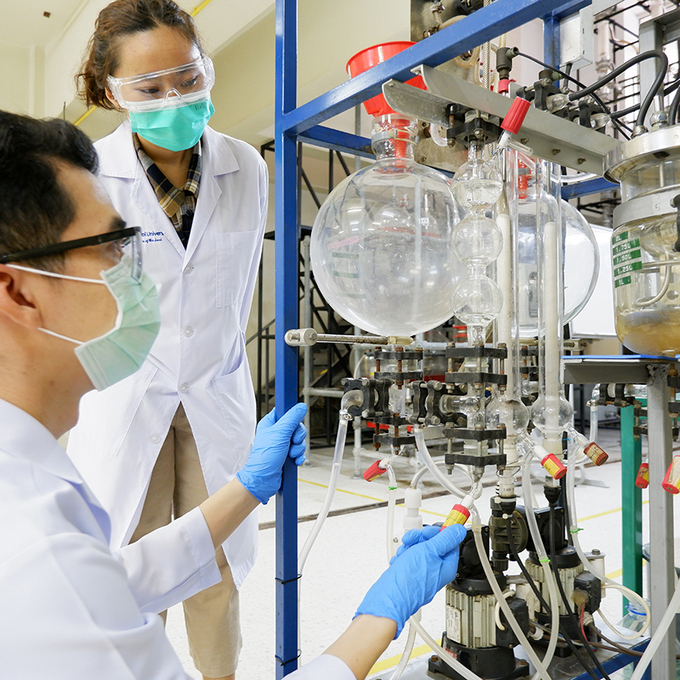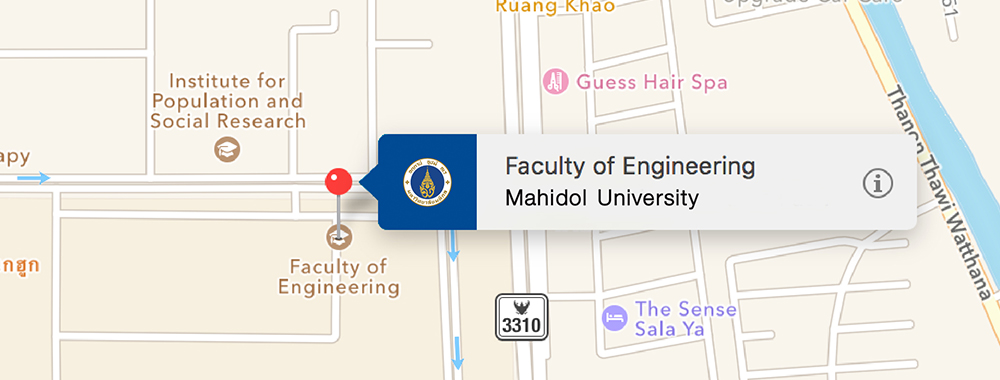Chemical Engineering Program
We aim to create engineers with expertise in chemical engineering, who have the creativity of innovators and entrepreneurial skills of business owners. Our graduates have contributed to a broad range of related industries.
Programs
- Chemical Engineering
PEO 1: Graduates practice their craft proficiently and competently using technical skills and knowledge they have acquired to design efficient chemical engineering processes and systems, and solve complex chemical engineering and related problems.
PEO 2: Graduates pursue professional growth through advanced studies in chemical engineering or related interdisciplinary fields through self-study or acquisition new knowledge using appropriate learning strategies.
PEO 3: Graduates work effectively in multidisciplinary teams using their communication, leadership and interpersonal skills.
PEO 4: Graduates apply ethical codes in professional practice with social responsibility and the protection of the environment.PEO 1: Graduates practice proficiently as professional chemical engineers in the economic and industrial aspects.
PEO 2: Graduates pursue professional growth through advanced studies and research in chemical engineering, or related interdisciplinary fields of advanced materials, renewable energy, food and pharmaceutical engineering, or environmental engineering.
PEO 3: Graduates function efficiently in multidisciplinary teams using their communication, leadership and interpersonal skills.
PEO 4: Graduates conduct themselves in a professional and ethical manner with social responsibility and the protection of the environment.SO 1: An ability to identify, formulate, and solve complex engineering problems by applying principles of engineering, science, and mathematics.
SO 2: An ability to apply engineering design to produce solutions that meet specified needs with consideration of public health, safety, and welfare, as well as global, cultural, social, environmental, and economic factors.
SO 3: An ability to communicate effectively with a range of audiences.
SO 4: An ability to recognize ethical and professional responsibilities in engineering situations and make informed judgments, which must consider the impact of engineering solutions in global, economic, environmental, and societal contexts.
SO 5: An ability to function effectively on a team whose members together provide leadership, create a collaborative and inclusive environment, establish goals, plan tasks, and meet objectives.
SO 6: An ability to develop and conduct appropriate experimentation, analyze and interpret data, and use engineering judgment to draw conclusions.
SO 7: An ability to acquire and apply new knowledge as needed, using appropriate learning strategies.Student Enrollment
Student Graduation*
Academic Year
No of student
Academic Year
No of student
% Graduation
2013
70
2016
59
84.29
2014
76
2017
66
86.84
2015
76
2018
70
92.11
2016
82
2019
70
85.37
2017
51
2020
45
88.24
2018
41
2021
34 (Expected)
82.93
Remark: *Drop out mostly from freshman students due to changing of area of interest.
- Chemical Engineering (International)
Program Objectives: On successful completion of this program, graduates will be able to:
PEO 1 Practice proficiently as professional chemical engineers in the economic and industrial aspects
PEO 2 Pursue professional growth through advanced studies and research in chemical engineering, or related fields
PEO 3 Function efficiently in multidisciplinary teams using their communication, leadership and interpersonal skills
PEO 4 Conduct themselves in a professional and ethical manners with social responsibility and the protection of the environment1. an ability to identify, formulate, and solve complex engineering problems by applying principles of engineering, science, and mathematics.
2. an ability to apply engineering design to produce solutions that meet specified needs with consideration of public health, safety, and welfare, as well as global, cultural, social, environmental, and economic factors.
3. an ability to communicate effectively with a range of audiences.
4. an ability to recognize ethical and professional responsibilities in engineering situations and make informed judgments, which must consider the impact of engineering solutions in global, economic, environmental, and societal contexts.
5. an ability to function effectively on a team whose members together provide leadership, create a collaborative and inclusive environment, establish goals, plan tasks, and meet objectives.
6. an ability to develop and conduct appropriate experimentation, analyze and interpret data, and use engineering judgment to draw conclusions.
7. an ability to acquire and apply new knowledge as needed, using appropriate learning strategies - Chemical Engineering (Dual Degree - University of Strathclyde, UK)



